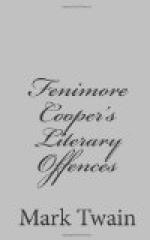I am sorry there is not room to put in a few dozen instances of the delicate art of the forest, as practised by Natty Bumppo and some of the other Cooperian experts. Perhaps we may venture two or three samples. Cooper was a sailor—a naval officer; yet he gravely tells us how a vessel, driving towards a lee shore in a gale, is steered for a particular spot by her skipper because he knows of an undertow there which will hold her back against the gale and save her. For just pure woodcraft, or sailorcraft, or whatever it is, isn’t that neat? For several years Cooper was daily in the society of artillery, and he ought to have noticed that when a cannon-ball strikes the ground it either buries itself or skips a hundred feet or so; skips again a hundred feet or so—and so on, till finally it gets tired and rolls. Now in one place he loses some “females”—as he always calls women—in the edge of a wood near a plain at night in a fog, on purpose to give Bumppo a chance to show off the delicate art of the forest before the reader. These mislaid people are hunting for a fort. They hear a cannonblast, and a cannon-ball presently comes rolling into the wood and stops at their feet. To the females this suggests nothing. The case is very different with the admirable Bumppo. I wish I may never know peace again if he doesn’t strike out promptly and follow the track of that cannon-ball across the plain through the dense fog and find the fort. Isn’t it a daisy? If Cooper had any real knowledge of Nature’s ways of doing things, he had a most delicate art in concealing the fact. For instance: one of his acute Indian experts, Chingachgook (pronounced Chicago, I think), has lost the trail of a person he is tracking through the forest. Apparently that trail is hopelessly lost. Neither you nor I could ever have guessed out the way to find it. It was very different with Chicago. Chicago was not stumped for long. He turned a running stream out of its course, and there, in the slush in its old bed, were that person’s moccasin-tracks. The current did not wash them away, as it would have done in all other like cases—no, even the eternal laws of Nature have to vacate when Cooper wants to put up a delicate job of woodcraft on the reader.




